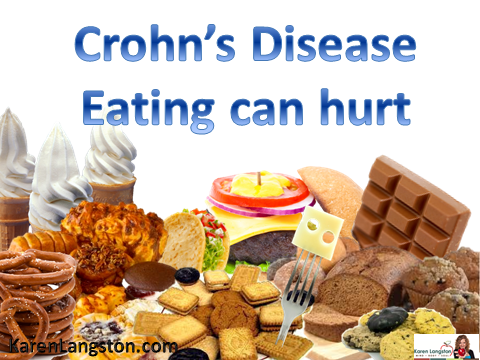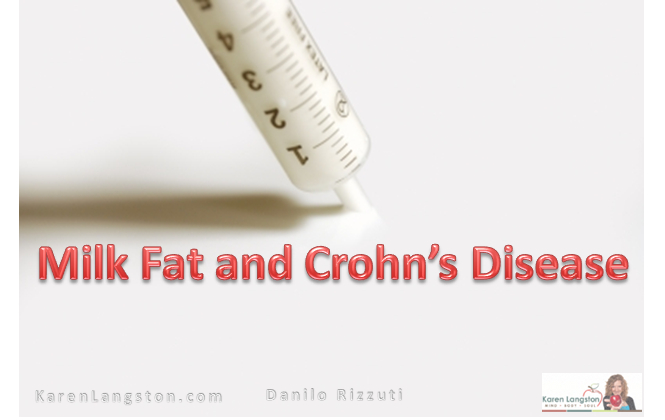Milk fat possible trigger for Crohn’s disease?
Saturated Fats Change Gut Bacteria–May Raise Risk for Inflammatory Bowel Disease such as Crohn’s Disease and Coilits.
I have been preaching for years that there is a direct correlation between what you eat and how you feel and your level of health. I also know that most of the ingredients found in typical North American foods (called SAD- standard American diet)are questionable at best and void of nutrients your body needs to function properly. I also know that part of my journey to healing and conquering Crohn’s Disease was removing nutrient devoid foods from my diet.
I must admit that I love when science catches up with what I have been educating clients about for years. At least now I have some proof and hopefully this will be enough for you to start changing your diet especially if you are suffering with Crohn’s Disease or Ulcerative Colitis.
Crohn’s disease is an inflammatory condition that is referred to as Inflammatory Bowel Disease, ileitis or enteritis affecting men, women and children at any time. Ulcerative colitis is also a type of inflammatory bowel disease (IBD) that affects the lining of the large intestine (colon) and rectum. Crohn’s disease affects all parts of the digestive tract from the mouth to the anus and has severe, embarrassing and at times unbearable symptoms.

According to a new study published in the journal Nature. Researchers at the University of Chicago found that concentrated milk fats, which are abundant in processed and confectionery foods, alter the composition of bacteria in the intestines. These changes can disrupt the delicate truce between the immune system and the complex but largely beneficial mix of bacteria in the intestines. The emergence of harmful bacterial strains in this setting can unleash an unregulated tissue-damaging immune response that can be difficult to switch off.
I completely agree with this study, however, I do have a problem with the inability of “switching off the immune response”. It is quite simple; remove the offending irritant, you allow your immune system to “settle down” thus switching off the inflammatory immune reaction. It is that simple. The tricky part, is understanding all of your inflammatory triggers and removing them as well. Granted this study is on mice, but is a classic example of what you eat, you become.
Researchers worked with a mouse model that has many of the characteristics of human IBD. Genetically deleting a molecule, interleukin 10, which acts as a brake on the immune system’s response to intestinal bacteria, caused about 25 percent of mice to develop colitis when fed a low-fat diet or a diet high in polyunsaturated fats. But when exposed to a diet high in saturated milk fats, the rate of disease development within six months increased to more than 60 percent. In addition, the onset, severity and extent of colitis were much greater than that observed in mice fed low-fat diets.
 Researchers found that an uncommon microbe called Bilophila wadsworthia was preferentially selected in the presence of milk fat. Previous studies had found high levels of B. wadsworthia in patients with appendicitis and other intestinal inflammatory disorders, including inflammatory bowel disease such as Crohn’s disease and Ulcerative Colitis.
Researchers found that an uncommon microbe called Bilophila wadsworthia was preferentially selected in the presence of milk fat. Previous studies had found high levels of B. wadsworthia in patients with appendicitis and other intestinal inflammatory disorders, including inflammatory bowel disease such as Crohn’s disease and Ulcerative Colitis.
Bilophila wadsworthia has an affinity for bile, a substance produced by the liver and released into the intestines to help break down ingested fats. Milk fats are particularly difficult to digest and require the liver to secrete a form of bile that is rich in sulfur. B. wadsworthia thrives in the presence of sulfur. So when the bile created to dissolve milk fats reaches the colon, it enables wadsworthia to blossom. Another study found that an invitro study suggested that it may be able to attach to epithelial cells of the colon.
“Unfortunately, these can be harmful bacteria,” Chang said. “Presented with a rich source of sulfur, they bloom, and when they do, they are capable of activating the immune system of genetically prone individuals.”
The byproducts of B. wadsworthia‘s interaction with bile also can amplify the effect. They serve as “gut mucosal barrier breakers,” said Suzanne Devkota, PhD, a member of Chang’s laboratory and first author of the study. “By increasing the permeability of the bowel, they enhance immune-cell infiltration, and that can induce tissue damage.”
Another note is the fact that us humans should not be drinking other mammals milk, especially cows milk. The only really good reason why most drink milk is because of the dairy bureau of Canada and U.S. Department of Agriculture, Bureau of Dairy Industry have paid in part to be included in the my plate (food pyramid), and Canada’s Food Guide they are a for profit business; they want you drinking milk.
There is also evidence that Mycobacterium avium subspecies paratuberculosis, or MAP, is common in U.S. dairy herds, activists argue, and it is not killed by conventional pasteurization and is linked to a potential trigger for Crohn’s disease. Another strike against milk. Transmission of MAP from infected cattle to humans through milk could explain much about the occurrence of Crohn’s disease, including its geographical distribution and rising incidence. Several large milk distributors in Britain have already changed their pasteurization procedures to make it more likely that the microorganism will be killed. The suspected links between MAP, milk and Crohn’s have received a great deal of attention in that country, but none in the United States.
Now raw milk is a whole other story, there is research showing that raw milk has benefits, however at this point in time I do not have the answers to whether or not raw milk contains Bilophila wadsworthia. In fact, this study does not reveal whether it was raw milk fats or processed milk. I think this is a big factor as well. However, given the fact that the milk fats are found in processed, refined foods as well as bakery products leads me to believe that it would be processed milk.
A sixteen year old Wisconsin boy was able to heal his Crohn’s disease by consuming raw milk, raw meat, and raw eggs. He started the diet, gaining eighty pounds, and losing all traces of his Crohn’s disease. Once health officials found out, the farmer came under scrutiny and was subpoena and ordered to pasteurize all milk.
It comes down to really investigating your food and drink. You can get almost immediate relief by removing foods and beverages with ingredients you can not pronounce and/or do not know what they are. This is where I have a problem with the low residue low fiber diet often recommended by dietitians and gastroenterologists. This type of diet leaves you really only being able to eat synthesized, chemically altered/engineered food that has little nutritional value. And I do know from the tweets and forums that many of you will eat fast food knowing you will “pay for it later.” Something I find hard to understand.
There are preliminary reports surfacing that bacteria based genetically modified foods has the ability to interact with our own microflora and change the genetic DNA. Now that is really scary because we do not know the long term affects of this process. And for me, that is enough to omit all genetically modified foods, soy and canola from my diet!
When it comes to Crohn’s disease and Colitis you have to look at all factors in order to be symptom and pain free. You have to look at diet, lifestyle, stress, enviroment and emotional out look.
This is the first research into the possibility of looking at external influences as a possible trigger for Crohn’s disease and Coilits. Although epigenetics has already proven that it is external influences that govern the expression of genes.
Much of the recent progress in understanding the biology of inflammatory bowel disease has focused on gene variants that can increase risk of delveloping inflammatory bowel disease such as Crohn’s disease or Ulcerative Coilitis. This study puts the focus on changing environmental factors that might trigger the disease in high-risk patients. It is also the “first plausible mechanism showing step-by-step how Western-style diets contribute to the rapid and ongoing increase in the incidence of inflammatory bowel disease,”
It is a major step in the right direction in removing the triggers to relieving your Crohn’s symptoms.
Tired of painful flare-ups, achy joints, low energy and held hostage by your toilet? Sign up for your FREE 7 tips in 7 days to Conquering Crohn’s Disease and subscription to Healthy Bites EZine for great tips, videos, recipes, interviews and exclusive articles that you can use to take control and tame your Crohn’s disease. Click on this link and get started.
Keep reading more on the subject of Crohn’s Disease
- Read the latest on Crohn’s Disease in our Articles section »
- Learn more about Crohn’s Disease symptoms »
- Explore Crohn’s Disease resources »
- Ask Karen: best vitamin/mineral for Crohn’s Disease on a budget
Check out these great videos on Crohn’s Disease
Most of this article was taken from:
Western diet changes gut bacteria and triggers colitis in those at risk
The University of Chicago Medicine
Communications
950 E. 61st Street, Third Floor
Chicago, IL 60637
Phone (773) 702-0025 Fax (773) 702-3171
Original Study:
Nature International Weekly Journal of Science
Dietary-fat-induced taurocholic acid promotes pathobiont expansion and colitis in Il10−/− mice
- Suzanne Devkota, Yunwei Wang, Mark W. Musch, Vanessa Leone, Hannah Fehlner-Peach, Anuradha Nadimpalli, Dionysios A. Antonopoulos, Bana Jabri & Eugene B. Chang, Affiliations Contributions Corresponding author
- Nature (2012) doi:10.1038/nature11225 Received Accepted Published online
The post Saturated Fats Change Gut Bacteria–May Raise Risk for IBD such as Crohn’s Disease appeared first on .


